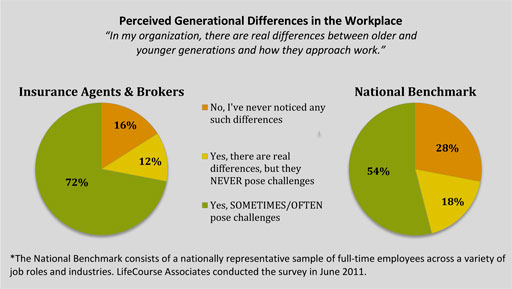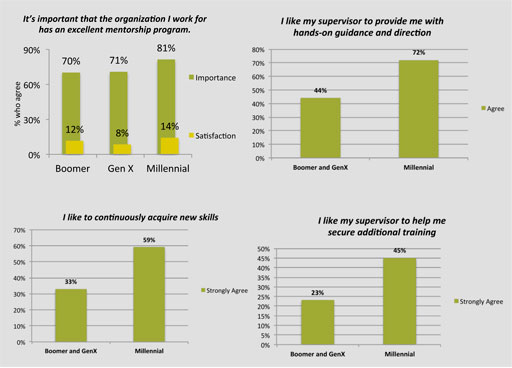How to manage the millennial generation in the workplace isstumping both baby boomers and Gen Xers. But the generation gap isespecially acute in the independent agent-broker (IAB) universe,where 84 percent of employees say there are real generationaldifferences regarding work, and 72 percent agree that thesedifferences pose challenges in their workplace.
|That's the finding of a “Independent Insurance Agents andBrokers: The Generation Gap,” new study commissioned by Assurex Global andproduced by LifeCourseAssocs., Great Falls, Va.
|While nearly 3 of out 4 Americans agree that “there are realdifferences between older and younger generations and how theyapproach work,” the 72 percent of the IAB universe who cite itas a challenge as higher than the national average, the reportstates.
|This could be attributed to the fact that millennials are alsosignificantly underrepresented among the agencies surveyed,comprising only about 15 percent of the workforce, compared withthe 22 percent national average, said F. Warren Wright, executivevice president of LifeCourse.
|
LifeCourse surveyed 47 agencies and brokerages, all affiliatedwith Assurex, representing all sizes and geographic regions. Therewere 4,986 individual respondents from all three generationalbracket, Wright said.
|Much of the misunderstanding revolves around the dramaticallydifferent ways in which the three generational segments approachwork, Wright said. “Millennials prefer frequent and exhaustivefeedback on their performance, as well as lots of coaching,guidance and mentorship– more than their managers ever receivedwhen they started out in the business,” he said. “A typicalresponse we got from boomer and GenX managers was, 'I never had alot of handholding and training when I was their age, so why shouldthey?'”
|Read related: OMG! You Work with Millennials!
|Key study findings include:
||
Millennials give the industry low marks as a place towork. Only 24 percent have a favorable perspective of theindependent agency system, compared with 31 percent for Gen X and43 for baby boomers. This is a problem because millennials areheavily networked, and spreading this negative perception throughbad word-of-mouth could thwart industry efforts to recruit andretain, Wright said.
|
Millennials respect their elders, but the feeling isn'tmutual. Millennials have the most favorable view of othergenerations in the workforce, with 19 percent rankingXers ”very favorably” and 20 percent rankingboomers ”very favorably.” In comparison, only 9 percent ofXers rated millennials very favorably, and only 5 percent ofboomers ranked millennials very favorably.
|“We had no idea there would be such an imbalance in perceptions,but it is consistent with our understanding of generations,” Wrightsaid. “Millennials are bonded to their parents and have a strongcomfort level, if not familiarity with authority…We've had managerstell us that millennials will march into the CEO's office and startasking questions and telling the CEO how things could be improved.This is not hubris as much as it is an informal comfort level withauthority, like they do with their parents.”
|Unfortunately, this respect is not reciprocated. “'Kids today'are always looked at with somewhat of a jaundiced eye, butcertainly the spread in numbers was larger than we would havethought,” Wright said. “One company senior manager told me thatevery time a new young 'kid' was hired, the less he would take outin profit sharing. So maybe there is some resentment, plus theremight be a feeling that they are not worth all the work you have toput into them. This is cynical and not productive, of course, butexplains the numbers.”
||
Millennials are frustrated by the lack of advacementmechanism in the industry. More than 40 percent ofXers and millennials currently in an agency sales role say they are“extremely interested” in agency ownership–yet only aboutone-quarter strongly agreed that the mechanisms are in place forthem to achieve this.
|Read related: “ExtremeMakeover: The Independent Agency Edition.”
|
Producer performance is linked to engagement–and for theabove reasons and more, millennials are not engaged. Themost engaged quartile has more top producers than the least engagedquartiles. By moving the dial on generational alignment, agencypartners can expect to improve not only working relationships amongthe generations, but also see results in the bottom line, Wrightsaid.
||
Millennials desperately want feedback and mentoring inthe workplace. Millennial job satisfaction is driven bycontinual improvement and feedback. The LifeCourse survey concludesthat coaching millennial employees will yield increasedengagement engagement, leading to increased productivity, profitand perpetuation.
|In conjunction with the survey, LifeCourse was commissioned byChubb to develop a new trainingprogram for its agents on “Coachingthe High Potential Millennial Producer,” which launches atChubb's Warren, N.J. headquarters April 25 and 26.
|“It's important for managers to realize that a generation is notjust an age bracket,” Wright said. “Every generation is shaped indifferent ways by their experiences and is unique from any othergeneration. So millennials are different, and will always bedifferent than boomers and Xers. So as much as they may not likeit, boomers and Xers need to 'get with the program' if they want toshape the industry for success in the future.”
Want to continue reading?
Become a Free PropertyCasualty360 Digital Reader
Your access to unlimited PropertyCasualty360 content isn’t changing.
Once you are an ALM digital member, you’ll receive:
- All PropertyCasualty360.com news coverage, best practices, and in-depth analysis.
- Educational webcasts, resources from industry leaders, and informative newsletters.
- Other award-winning websites including BenefitsPRO.com and ThinkAdvisor.com.
Already have an account? Sign In
© 2024 ALM Global, LLC, All Rights Reserved. Request academic re-use from www.copyright.com. All other uses, submit a request to [email protected]. For more information visit Asset & Logo Licensing.








